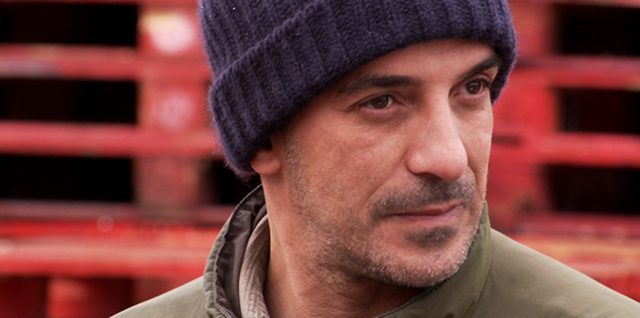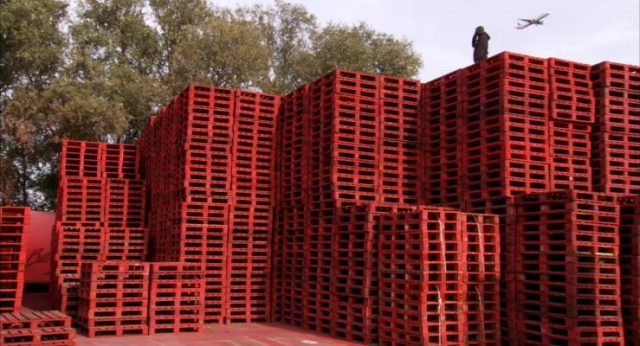
Rabah Ameur-Zaïmeche will be at FIAF on November 1 to screen and discuss ADHEN, which he directed, cowrote, and stars in
CINÉSALON: ADHEN (DERNIER MAQUIS) (Rabah Ameur-Zaïmeche, 2008)
French Institute Alliance Française, Florence Gould Hall
55 East 59th St. between Madison & Park Aves.
Tuesday, November 1, $13, 4:00 & 7:30
Series continues Tuesdays through December 13
212-355-6100
www.fiaf.org
 FIAF celebrates the career of French-Algerian indie writer, director, actor, and producer Rabah Ameur-Zaïmeche in its November-December CinéSalon program “Poetic and Political: The Cinema of Rabah Ameur-Zaïmeche.” The seven-week series will include all five of his films, realistic meditations on immigration, family, history, religion, and rebellion made between 2001 and 2015. The festival begins November 1 with 2008’s gentle and patient slice-of-life drama, Adhen. Christian Milia-Darmezin stars as Titi, a new Muslim convert who works at a small French company that repairs shipping pallets. Titi is teased by some of his fellow workers (Serpentine Kebe, Abel Jafri, Mamadou Koita, Sylvain Roume as Giant, Salim Ameur-Zaïmeche as Bashir) because he is not circumcised, so the not-very-bright Titi takes scissors to himself, landing him in the hospital. Meanwhile, the boss, Mao (Rabah Ameur-Zaïmeche), sets up a mosque for his employees, believing it will be good for morale, although he threatens to cut their bonuses if they don’t attend prayers every Friday. Growing worker unrest over low pay and long hours increases when Mao doesn’t let them participate in the selection of the Iman (Larbi Zekkour) and the mechanics start talking about unionizing.
FIAF celebrates the career of French-Algerian indie writer, director, actor, and producer Rabah Ameur-Zaïmeche in its November-December CinéSalon program “Poetic and Political: The Cinema of Rabah Ameur-Zaïmeche.” The seven-week series will include all five of his films, realistic meditations on immigration, family, history, religion, and rebellion made between 2001 and 2015. The festival begins November 1 with 2008’s gentle and patient slice-of-life drama, Adhen. Christian Milia-Darmezin stars as Titi, a new Muslim convert who works at a small French company that repairs shipping pallets. Titi is teased by some of his fellow workers (Serpentine Kebe, Abel Jafri, Mamadou Koita, Sylvain Roume as Giant, Salim Ameur-Zaïmeche as Bashir) because he is not circumcised, so the not-very-bright Titi takes scissors to himself, landing him in the hospital. Meanwhile, the boss, Mao (Rabah Ameur-Zaïmeche), sets up a mosque for his employees, believing it will be good for morale, although he threatens to cut their bonuses if they don’t attend prayers every Friday. Growing worker unrest over low pay and long hours increases when Mao doesn’t let them participate in the selection of the Iman (Larbi Zekkour) and the mechanics start talking about unionizing.

A muezzin (Serpentine Kebe) calls fellow workers to prayer in Rabah Ameur-Zaïmeche’s ADHEN
Adhen is beautifully shot by cinematographer Irina Lubtchansky, who lets her camera linger at the end of scenes, moving away from the characters and slowly turning up from the stacks and stacks of red pallets to a lightly cloudy bright blue sky or from a conversation about raises to trees blowing in the wind on the shore of a flowing river. The pallets are piled so high they are like physical barriers to the workers’ success, except when the muezzin (Kebe) climbs to the top and calls everyone to prayer, as if religion is the only answer to their problems. Later, when Giant encounters a trapped animal he thinks is a huge rat, the parallel between the frightened creature and the employees is palpable. Ameur-Zaïmeche, who cowrote the script with Louise Thermes, even gets away with such overt metaphors as a boss named Mao dealing with red pallets that transport commercial goods. He maintains a slow, easygoing pace throughout, regardless of where the emotions of the characters and story lead, from funny and proud to angry and resentful. Winner of the Special Jury Prize at the Dubai International Film Festival, Adhen is screening November 1 at 4:00 and 7:30; the later show will be followed by a Q&A with Ameur-Zaïmeche, moderated by Algerian-born French author and NYU visiting professor Zahia Rahmani. “Poetic and Political: The Cinema of Rabah Ameur-Zaïmeche” continues Tuesday nights through December 13 with Ameur-Zaïmeche’s Wesh Wesh, Back Home (Bled Number One), Smugglers’ Songs, and Story of Judas in addition to an election-night Director’s Choice screening of Stanley Kubrick’s Dr. Strangelove or: How I Learned to Stop Worrying and Love the Bomb, followed by a reception with live election results.